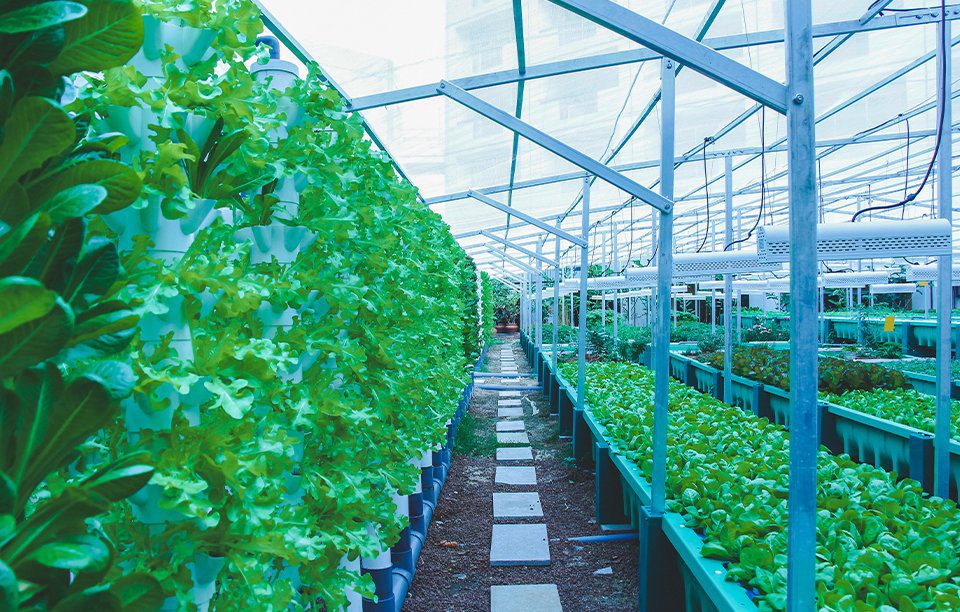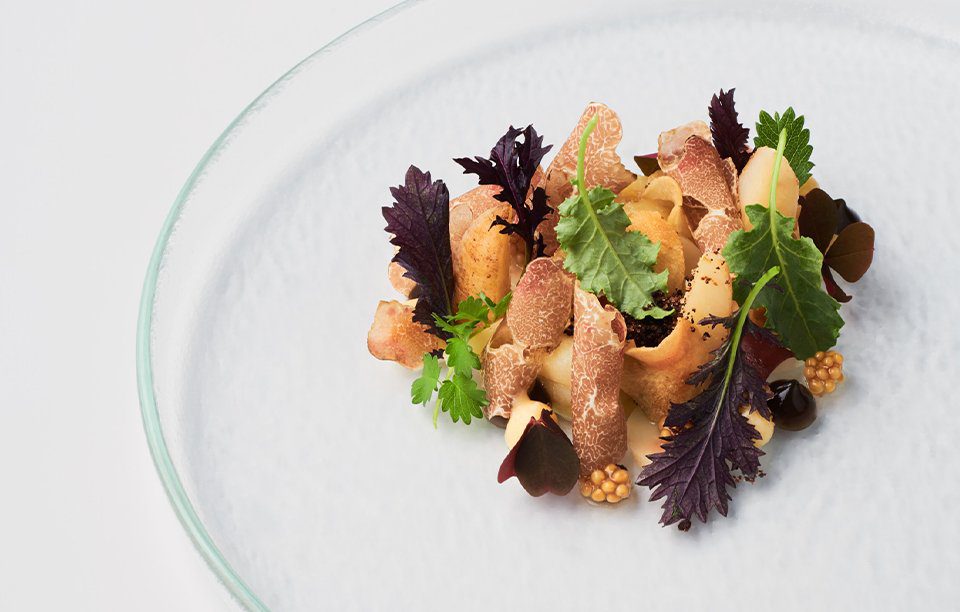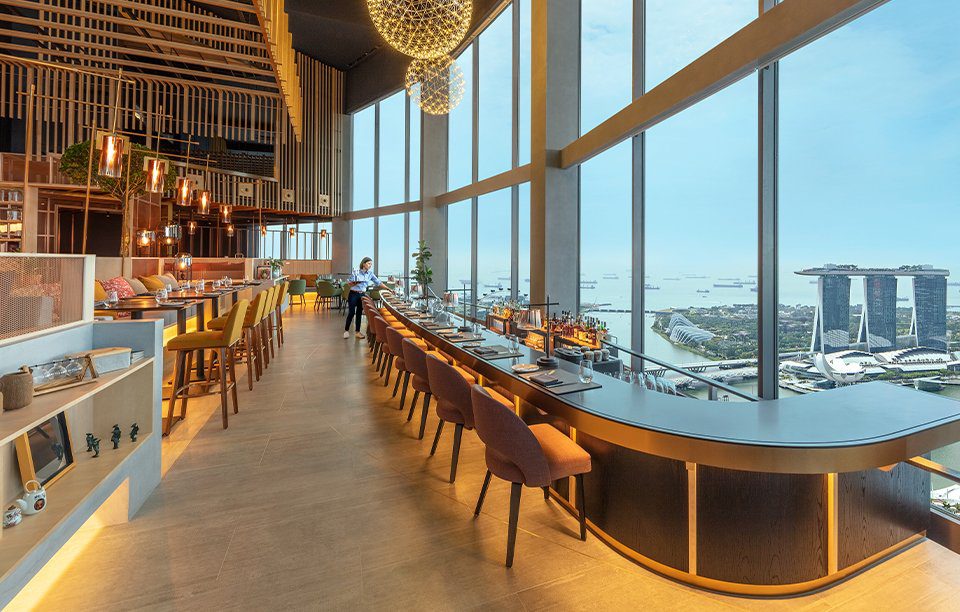Fairmont Singapore and Swissôtel The Stamford recently launched Singapore’s first hotel urban aquaponics garden, to cater to rising demand for fresh quality produce from guests.
Impressed at such a fantastic story and initiative, I recently went to check it out for myself to find out more.
Nestled on level five’s rooftop between the adjoining Fairmont Singapore and Swissotel The Stamford hotels, this 450m squared humming aquaponics garden will grow and supply produce that’ll meet an amazing estimated 30% of vegetable and 10% of the hotels’ fresh fish needs every month.
What is Aquaponics you may ask? Aquaponics combines aquaculture – the growing of fish and other aquatic life – with hydroponics, which is growing plants without soil.
It’s a sustainable, pesticide-free solution to traditional methods with substantially higher yields while requiring less water, space and labour.
The hotels’ general manager and passionate project brainchild, Marcus Hanna tells me that the gardens are “the result of months of research, looking at the best possible ways to meet demand among guests and consumers for fresh food while optimising limited space for growing produce and minimising water wastage.”
While I’d seen photos of the garden before I visited, I can’t say that any photos really do it justice (mine included) when it comes to understanding the sheer size of the project and the depth of detail until you see it for yourself.

What’s the challenge?
Since 90% of Singapore’s produce is currently imported, not only are food costs extremely high and volatile for local hospitality businesses but the environmental impact of transport and the associated waste is also costly and unnecessary. Importing food produce over distance and in such a tropical climate also brings its own health and safety challenges.
Those challenges continue when you consider that the small city-state, nation is only 716 square kilometres in size (London is double this) and is home to 5.6 million residents. Any spare space to grow or farm anything naturally comes at a premium.
In March this year, Singapore launched a “30 by 30” strategy to raise Singapore’s food self-production level from the current 10 per cent to 30 per cent of total food needs by 2030.
The government strategy includes plans to better use technology, source alternative spaces, educate more experts in the field and place more demand on homegrown produce.
What’s the solution?
In a first, of its kind for Singapore hotels, The vast 450m squared aquaponics garden will grow and supply products that’ll meet an amazing estimated 30% of vegetable and 10% of fresh fish needs across the hotels every month.
By doing this, they’ll be meeting Singapore’s “30 by 30” target as well as enhancing the quality of their own produce in the hotel’ restaurants while saving money in the process.
“Over 90% of the food consumed in Singapore is imported. As a leading hotel group and a purpose-driven organisation, we have a stake in building a more sustainable Asia for future generations. We want to do our part, not only in aligning with the Singapore government’s 30 by 30 vision, but also enhancing our guests’ dining experience by serving them only the freshest, healthiest produce, obtained in the most sustainable way possible,”
Marcus Hanna, General Manager of Fairmont Singapore and Swissôtel The Stamford.
Marcus tells me that the ‘Edible Flowers’ used in the hotel’s JAAN restaurant (as featured above) can cost up to SG$35 each for a small punnet. As a result, being able to grow anything sustainably on-site becomes an economic no brainer and a win-win for everybody.
It’s such a no brainer in fact, that Marcus estimates the garden will have already paid for itself in just a year.


What will the positive impact be?
Since launching the garden, Marcus says the hotels have had an overwhelmingly positive response from local and global media and guests alike as well as enquiries from school groups and hospitality bodies enquiring to visit.
Aquaponics is just one of many impressive sustainability initiatives the Fairmont Singapore and Swissôtel The Stamford have rolled out over the last couple of years.
The hotels also deploy an AI system to analyse and minimise food waste. An Eco-Wiz food digester system converts leftover food into water and compost, and a food waste reduction programme with waste management firm Good For Food helps reduce the amount of food sent to landfills.
Additionally, Fairmont Singapore’s new South Tower rooms and suites come with Swisspro freshwater taps installed – eliminating the need for single-use plastic bottled water.
Similarly, at Raffles City Convention Centre, plastic water bottles that used to be provided in the meeting rooms have since been replaced by water dispensers that are conveniently available within easy access of event spaces; and each function room is furnished with re-fillable glass carafes.

Fairmont Singapore and Swissôtel The Stamford also sources sustainable produce where possible, using no endangered fish and was the first hotel in Singapore to stop serving sharks fin.
The Hotels work with local oyster farmers for SKAI’s brunch concept; and unconsumed bread from breakfast service is given daily to a local charity, Food from the Heart, which supports families in need.
The move follows on from another first last year, with the launch of Swissotel The Stamford’s ‘Vitality Rooms’ featuring an innovative in-room ‘Wellbeing centre’.
“We champion innovation and are constantly looking at ways to enhance overall guest experience and improve operational efficiencies. Aquaponics ticked the boxes for us and provided a wonderful means for us to produce the volume of food we need on property within a short turnaround. We’re hopeful that this breakthrough for the hospitality industry will inspire other companies to help drive a positive movement towards greater sustainability for the community at large.” Says Marcus.
Find out more: www.swissotelsingapore/aquaponicsgarden
How can you travel to change the world?
Congratulations! By reading this post and taking some of these insights on board, you’ve already made a difference.
Now you can easily create your impact by sharing your newfound knowledge with other friends who you think would also be interested.
Ultimately, responsible travel comes down to common sense – stay curious, keep yourself up-to-date with the challenges at hand and make yourself accountable for your actions on your travels.